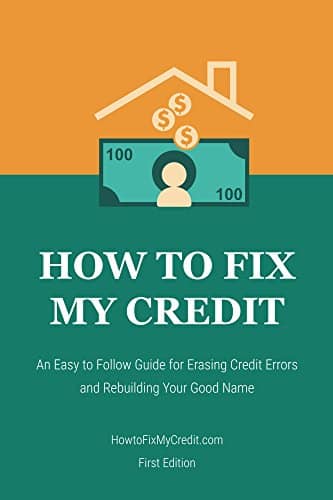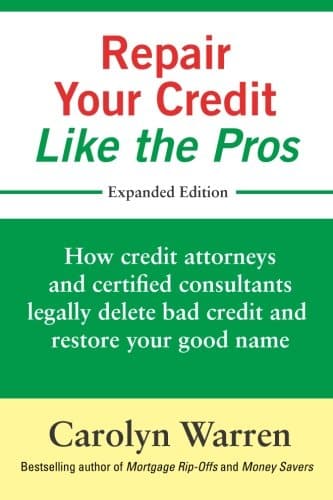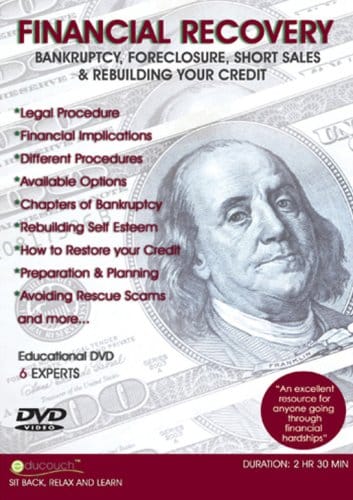In the complex dance of financial stability, the steps to rebuilding credit can be a tricky routine to master—especially when the dance floor is scattered with misleading myths. As we tread into 2024, your path to fiscal health must be clear of these fallacies. Sit tight as we debunk five insane myths about rebuilding credit that have been tripping up consumers for far too long.

Unveiling the Truth Behind Rebuilding Credit
Rebuilding credit isn’t a sprint; it’s more of a marathon. The journey requires patience, smart strategies, and a good deal of myth-busting. Before we jump into the deep end, grasp this essential mantra: not all is as it seems in the land of credit scoring.
How to Fix My Credit An Easy to Follow Guide for Erasing Credit Errors and Rebuilding Your Good Name (Credit Repair Books )

$4.99
“How to Fix My Credit: An Easy to Follow Guide for Erasing Credit Errors and Rebuilding Your Good Name” is an indispensable tool for individuals striving to overcome credit challenges and improve their financial standings. This comprehensive guidebook provides a step-by-step approach to identifying inaccuracies on credit reports, understanding credit laws, and implementing effective dispute strategies to erase errors that can besmirch one’s credit history. It is a practical resource written in an accessible language, ensuring that users from all backgrounds can navigate the complexities of credit repair with confidence.
The book demystifies the daunting process of communicating with credit bureaus and creditors by offering sample letters and legal references to support your claims. By following the detailed instructions outlined in each chapter, readers will learn how to organize their documents, use their rights to their advantage, and monitor their credit scores for changes. The author addresses various scenarios and solutions, making it relevant for a multitude of credit repair situations, ensuring no reader feels left behind.
Beyond just repairing credit, this guide delves into strategies for rebuilding a positive credit history and maintaining good financial habits. It includes advice on managing debt, negotiating with lenders, and creating a budget that allows for timely bill payments and debt reduction. By the end of “How to Fix My Credit,” readers will not only have the tools to repair their credit but will also be empowered with the knowledge to build a solid financial foundation, making this book a valuable asset for long-term financial health and stability.
Myth 1: You Must Carry a Credit Card Balance to Improve Your Score
The Real Story: How to Rebuild Credit Without Unnecessary Debt
Hold the phone! Do you really need to lug around that balance on your credit card to boost your score? The short answer: absolutely not. It’s a myth as bonkers as socks with sandals. Carrying a balance only leads to Annual Percentage rate fees that bites away at your hard-earned cash.
Instead, credit mavens recommend using your cards for purchases and promptly paying off the balances each month. This shows lenders you’re a borrowing prodigy, able to handle credit with the finesse of a tightrope walker—steady and sure-footed.

| Rebuilding Credit Criteria | Description | Timeline |
|---|---|---|
| Starting Point | A poor credit score of around 500. | Immediate |
| Target Score | Improvement to a fair credit score, typically in the 580-669 range. | 12-18 months |
| Credit Utilization | Reducing monthly debt and managing credit card balances effectively. | Ongoing |
| Budgeting | Setting up a budget plan to track and control spending. | Immediate setup; ongoing management |
| Credit History | Establishing or maintaining a record of timely payments and responsible credit use with tools like secured credit cards. | Within a few months to appear on credit history |
| Payments | Making regular, on-time payments and, if possible, additional payments throughout the month to keep balances low. | Immediate and ongoing |
| Dispute Errors | Proactively checking credit reports and disputing any inaccuracies or errors found. | As errors are detected |
| Credit Limits | Requesting higher credit limits to improve credit utilization ratio (credit used vs. credit available). | As needed, after establishing some credit history |
| Monitoring Progress | Regular review of credit score and reports to track improvements and adjust strategies as necessary. | At least annually, or as credit reports are updated |
Myth 2: Checking Your Credit Report Hurts Your Credit Score
Clarifying Soft Inquiries vs. Hard Inquiries
Ever heard the one about checking your credit score so often, it starts to plummet? It’s hogwash. Like thinking Heroes Del Silencio would damage your hearing. When you peek at your own credit report, it’s a soft inquiry, people—it doesn’t ding your credit. In fact, it’s like giving yourself a financial checkup. It’s the hard inquiries, like when a lender checks your credit before giving you a loan, that can affect your score. Think of it as a financial version of the Intertek email approach — looking for quality assurances in your credit health.

Myth 3: All Debt Is Bad Debt When It Comes to Your Credit Score
Understanding the Influence of Different Types of Debt
Imagine believing that all debt is like a bad movie sequel—avoid at all costs. Thankfully, the world of credit is more Inception than straight-to-DVD horror flick. Some debts, like installment loans or a well-managed mortgage, show you can commit long-term, like the all-star inception cast to their complex roles. These can actually bolster your credit history, showing lenders that you’re as reliable as a sunrise.
The Genetic Make Up of Rebuilding Your Credit

$22.06
Title: The Genetic Make-Up of Rebuilding Your Credit
In the complex world of personal finance, “The Genetic Make-Up of Rebuilding Your Credit” emerges as a comprehensive guide for individuals seeking to understand and improve their credit score. This enlightening book breaks down the intricate components of credit reports, scoring systems, and provides step-by-step strategies for credit repair, much like decoding a strand of DNA. Each chapter dissects a different factor that affects credit healthfrom payment history and debt utilization to the impact of inquiries and public recordsilluminating the path to credit recovery with easy-to-grasp analogies and clear-cut advice.
With an empathetic tone and a focus on actionable information, the author equips readers with the tools necessary to reconstruct their credit profiles from the ground up, emphasizing the importance of consistent habits and responsible financial behavior. This tome acts as a financial advisor, offering detailed explanations on how various financial products, such as loans and credit cards, can be leveraged for credit building, not just debt accumulation. Readers are encouraged to engage in exercises throughout the book that mimic the trial and error of laboratory experiments, giving them hands-on experience with building a better credit record.
Not just content to guide readers out of bad credit, “The Genetic Make-Up of Rebuilding Your Credit” also dedicates substantial discourse towards maintaining and protecting newfound credit stability. Shedding light on the mechanics of the credit industry, the author educates readers on how to interpret and respond to changes in their credit reports, akin to a biologist responding to mutations within a genetic sequence. This pivotal resource empowers readers to make informed decisions about their financial future, thereby promoting a strong and healthy credit lifeone decision at a time.
Myth 4: You Can Instantly Fix Your Credit Score with Credit Repair Companies
Evaluating Credit Repair Services and Realistic Timelines
Beware of those credit repair services swanning around, promising instant credit nirvana. They’re like a scream 6 poster—eye-catching but hiding the real story. While a repair credit service can guide you through the process, nobody can magically erase legitimate black marks on your record. Remember, rebuilding credit is like nurturing a plant—it needs time, care, and the right environment to grow.

Myth 5: Closing Old Credit Accounts Will Skyrocket Your Credit Score
Analyzing the Impact of Credit History Length on Rebuilding Credit
If anyone tries selling you the old chestnut that closing old credit accounts will send your score into the stratosphere, don’t bite. That’s like cutting off Spiderman mid-web-swing; you’re just shortening your credit history, which is key to a healthy score. Keep those old accounts open to prove you’ve got the credit equivalent of a fine vintage wine—a long and delightful history.

How to Rebuild Credit the Right Way: Tips and Best Practices
So, how do you rebuild credit? It’s about as straightforward as a potluck dinner—you bring to the table what you can, and with time, it turns into a feast. Here’s the real deal:
By the way, don’t forget to gauge your progress. It’s believed that jumping from a credit score of about 500 to a fair score in the 580-669 range takes around 12 to 18 months of responsible credit use. That’s a timeline that even the most patient gardener can handle.
Repair Your Credit Like the Pros How credit attorneys and certified consultants legally delete bad credit and restore your good name

$14.99
“Repair Your Credit Like the Pros: How credit attorneys and certified consultants legally delete bad credit and restore your good name” is an essential guidebook for anyone struggling with poor credit scores and looking to navigate the complex world of credit repair. This comprehensive resource demystifies the often-confusing realm of credit reports, scores, and laws, offering readers insider knowledge previously available only to professional credit consultants and legal practitioners. Through clear explanations and step-by-step instructions, the book empowers individuals to take action by employing proven techniques and legal strategies used by industry experts to erase negative entries and rebuild their credit profiles.
Each chapter of the book is meticulously crafted to educate the reader on how to interact with credit bureaus, handle debt collections, and understand their rights under the Fair Credit Reporting Act (FCRA). By implementing the advice and tactics outlined by experienced credit attorneys within these pages, readers learn how to effectively dispute inaccuracies, negotiate with creditors, and utilize consumer protection statutes to ensure their credit reports reflect only accurate, fair, and substantiated information. From tackling late payments and charge-offs to dealing with more severe issues like bankruptcies and foreclosures, this book provides a clear path forward for achieving a healthier financial standing.
Beyond just fixing past credit woes, “Repair Your Credit Like the Pros” also focuses on setting the reader up for future success by offering guidance on maintaining good credit and maximizing credit scores moving forward. With sample letters, real-life case studies, and interactive worksheets, the book serves as a practical tool that users can refer to repeatedly during their credit repair journey. Whether faced with minor credit blemishes or overwhelming credit obstacles, readers will find that by applying the methodologies and principles shared by credit repair professionals, they can pave the way to financial freedom and secure the good name they deserve.
Conclusion: Rebuilding Credit with Confidence and Clarity

Rebuilding credit isn’t an enigma wrapped in a riddle. It’s about staying true to proven practices, not get-rich-quick schemes or wishful thinking. Use this guide as your financial compass and rebuild your credit with the confidence of a captain steering a ship through clear waters. The myths are busted; now it’s time to rise like a phoenix from the ashes of misinformation and soar toward credit score success.
Rebuilding Credit: Busting Myths with Facts and Fun!
Hey there, folks! Let’s dive into the whirlwind world of credit repair and bust some myths that have been floating around faster than a tumbleweed in a western flick. Sit tight because we’re about to get the lowdown on rebuilding credit like never before!
The “Only Time Can Heal” Hogwash
So you’ve heard that time is the ultimate healer of your credit woes, huh? Well, not quite! Sure, time plays a role, but it’s not the only sheriff in town. You can take a stand and get proactive by learning How To fix Your credit score. It’s like putting a Band-Aid on a scrape—taking the right steps can speed up the healing process!
The “Credit Invisible” Conundrum
Alright, folks, gather around for this one. Some say if you’ve got a credit score that’s lower than a snake’s belly in a wagon rut, you might as well be invisible to lenders. That’s a bunch of baloney! You’re not a ghost, pal—there are ways to make yourself seen and heard again in the credit world. It’s about taking those small, crucial steps to set things right, and before you know it, you’ll be back on the financial map!
The “Close ‘Em All” Myth
Hold your horses before you go closing all your credit accounts in a panic! This move can backfire like a poorly maintained musket. It might seem like a good idea to shut down every line of credit, but it can actually harm your credit mix and history—two things that matter a bunch for rebuilding credit. What you need is a strategy, partner, not a one-size-fits-all approach!
The “Max-Out Maneuver” Misfire
Speaking of bad ideas, let’s talk about maxing out a credit card to show you can handle it. That’s as effective as trying to put out a fire with gasoline! It’ll just send your credit utilization through the roof and make lenders think you’re about as reliable as a cardboard umbrella. Keep your balances lower than a caterpillar’s belly, and you’ll be on the right track.
The “One Fix Fits All” Fallacy
Last but not least, don’t get fooled by the old “one fix fits all” fairy tale. Every credit history is as unique as a snowflake in a desert, and what works for your buddy at the bowling alley may not work for you. Rebuilding credit is a personalized journey, so you’ve gotta find the right path for your own financial footsteps.
Well, there you have it, amigos—five insane rebuilding credit myths, debunked with a dollop of fun and a sprinkle of facts. Remember, fixing your credit isn’t as mysterious as a locked chest at the bottom of the sea. With the right tools and a dash of know-how, you’ll be on your way to credit greatness. So don’t just sit there like a bump on a log; saddle up and start your credit rebuilding ride today!
Bankruptcy, Foreclosure, Short Sales & Rebuilding your Credit FINANCIAL RECOVERY

$14.99
“Bankruptcy, Foreclosure, Short Sales & Rebuilding Your Credit: Financial Recovery” is an essential guide for individuals navigating the daunting aftermath of financial distress. This comprehensive resource delineates the intricacies of bankruptcy procedures, elucidates the foreclosure process, and demystifies the concept of short sales, ensuring readers are equipped with the knowledge to make informed decisions. By breaking down complex legal and financial jargon into easy-to-understand language, this guide aims to ease the stress and uncertainty that often accompany situations of financial turmoil.
The second section of the book is dedicated to the pivotal strategies for credit rehabilitation. It provides a roadmap for repairing credit scores, managing debt effectively, and laying the groundwork for a stable financial future. Readers will learn the importance of budgeting, debt consolidation options, and how to negotiate with creditors. With actionable advice and step-by-step guides, the book empowers readers to take control of their financial recovery and avoid common pitfalls that can hinder the rebuilding process.
Beyond immediate recovery tactics, “Financial Recovery” also emphasizes the importance of long-term financial planning and resilience. It offers insights into building a robust financial foundation to protect against future economic downturns. Readers will be inspired to implement the best practices for sustaining healthy credit, saving for emergencies, and investing wisely. By the end of this enlightening guide, those affected by financial setbacks will not only be prepared to bounce back but also to thrive in their newly established financial stability.
What is the fastest way to rebuild credit?
Oh boy, the fastest way to rebuild credit? That’s like asking how to run a marathon without breaking a sweat! But here’s the scoop: pay those bills on time, keep your credit card balances low, and don’t go applying for new credit willy-nilly. It’s like trying to lose weight – there’s no magic pill, just good, old-fashioned financial diet and exercise.
How long does it take to rebuild credit from 500 to 700?
Geez, going from 500 to 700 is a bit of a climb, huh? Well, pulling yourself up that credit ladder can vary, but it’s usually not a sprint, more like a marathon. Expect a journey that could take anywhere from a few months to a few years, depending on your specific financial situation and habits. Patience and persistence are key!
How to raise your credit score 200 points in 30 days?
Ah, shooting for the stars, eh? Raising your credit score 200 points in just 30 days might sound like a fairy tale, and frankly, it kinda is. That’s a mighty leap that even financial wizards would struggle to conjure up. For significant improvements, you’ll want to play the long game, targeting errors on your report, slashing debt, and paying everything on time.
How to get a 700 credit score in 2 months?
Zooming to a 700 credit score in just 2 months? That’d be quite the magic trick! While small improvements are possible, large jumps like that are less common. Consistency is your best friend here––on-time payments and chip, chip, chipping away at that debt can set the stage for improvement over time.
How long will it take to fix a 500 credit score?
Fixing up a 500 credit score is sort of like training for a marathon after years of being a couch potato. You can expect it to take some time, with most folks needing a year or more to make substantial headway. Stick with it, and remember, slow and steady wins the race.
What builds credit the quickest?
If you’re all about that speedy credit build, think ‘credit express lane.’ Your best shot is to keep your credit utilization low and payment history spotless. Oh, and if you’re an authorized user on someone’s long-standing, pristine credit card? That can act like a turbo boost!
Can I pay someone to fix my credit?
Can you pay someone to fix your credit? Sure thing, but let’s keep it real—you can do most of what those companies offer by yourself, and without forking over the dough. There’s no magic wand to wave here; it’s more about rolling up your sleeves and getting your hands dirty in your own financial backyard.
Is A 650 A Good credit score?
Is a 650 credit score good? Well, it’s smack dab in the “fair” camp. You’re not living on easy street, but you’re outta the woods where the wild things (like super-high interest rates) live. Climb that credit mountain a bit more, and you’ll be sitting prettier.
Is A 600 A Good credit score?
Is a 600 credit score good? Hmm, it’s not the belle of the ball, that’s for sure. You’re in “fair” territory, which means lenders might give you the side-eye and not offer their best rates. It’s like showing up to a job interview in flip-flops – you might still get the gig, but you’re not making the best impression.
What is the best credit repair company?
Looking for the best credit repair company? Phew, that’s like picking the best donut in the shop, options galore! Look for one with sterling reviews, transparent pricing, and no pie-in-the-sky promises. And remember, those donuts—err, companies—can’t do anything you can’t do for yourself with a little elbow grease.
How many points does your credit go up after paying off a car?
After you pay off a car? Buckle up, because your credit might just get a nice bump, usually a few points or so. It’s not a mega-jump, but hey, every little bit helps when you’re fueling your credit score.
Can a tradeline help bad credit?
Tradelines, eh? They can be like giving your credit a cup of espresso if they’re positive. But buyer beware, not all tradelines are created equal, and the effects can vary. Just like with any financial remedy, you’ll want to do some homework before diving in.
Should I pay off my credit card in full or leave a small balance?
Pay off your credit card in full, or leave a small balance? Ah, that’s a financial urban legend that just won’t die. Go ahead and wipe that slate clean every month if you can. It keeps those pesky interest gremlins at bay and shows you’re on top of your game.
Can you buy a house with a credit score of 700?
With a 700 credit score, can you buy a house? Oh, you bet your bottom dollar! That score is like a golden ticket to better rates and more eager lenders. You won’t exactly be the wolf of Wall Street, but you’ll have the red carpet rolled out a bit.
Why is my credit score going down when I pay on time?
Credit score dipping even when you’re paying on time? Oof, that stings. It could be high balances or someone else’s info sneaking onto your report. Keep a hawk-eye on that credit report and don’t be afraid to dispute any mistakes.
How to raise credit score 100 points in 30 days?
Raising your credit score 100 points in 30 days is like trying to win the lottery – not impossible, but don’t bet the farm on it. Tackle any credit report errors, get those payments bang on time, and keep your wallet on a leash (a.k.a. keep your credit utilization low).
How to get a 720 credit score in 6 months?
Getting to a 720 in 6 months? That’s a tall order, but not unreal. It’s like building muscle: consistent workouts (payments) and a good diet (low balances) can buff up that credit score, though results may vary depending on your current financial shape.
How can I raise my credit score 100 points overnight?
Raising your credit score 100 points overnight is basically a financial fairy tale. I mean, if you find that genie’s lamp, let me know! But for us mere mortals, credit building is more of a slow dance than a wild jig.
How long does it take to rebuild credit score?
Rebuilding your credit score is a bit like a game of snakes and ladders. It will take time, and the exact duration can really vary. We’re talking typically months or even years, so lace-up those boots and get ready to climb back up that credit score leaderboard!



